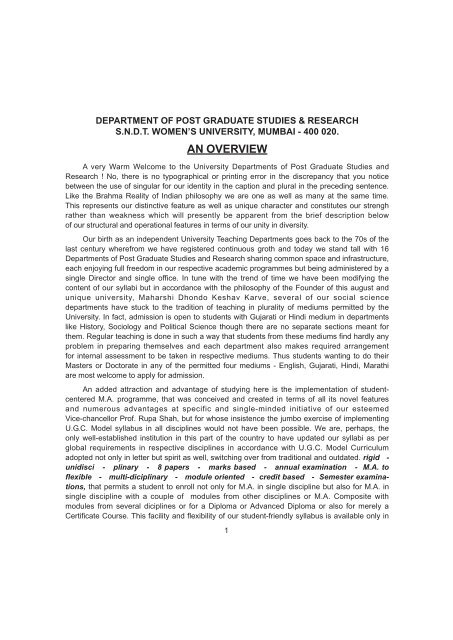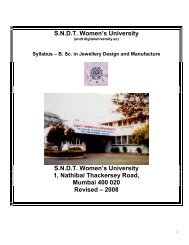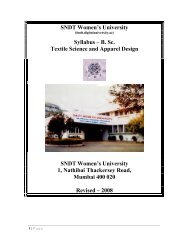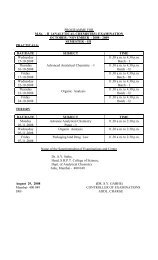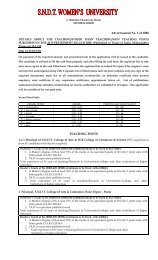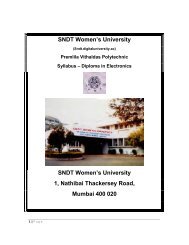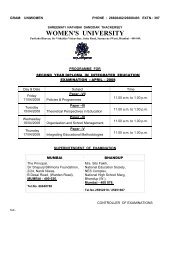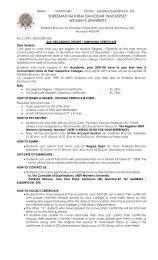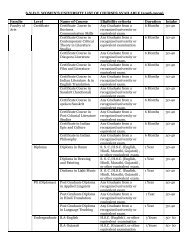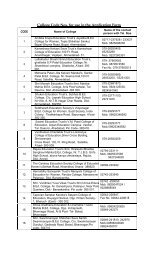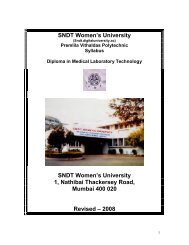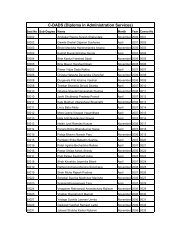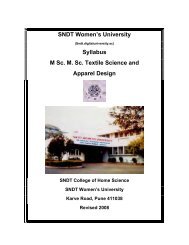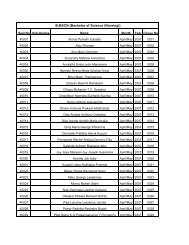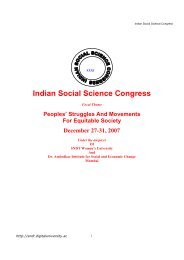Hand Book 2008
Hand Book 2008
Hand Book 2008
Create successful ePaper yourself
Turn your PDF publications into a flip-book with our unique Google optimized e-Paper software.
COURSE AND DURATIONM. A. -- (4 Semesters)M. Phil. -- One Year, Six MonthsM. Com. -- (4 Semesters)Ph. D. -- Minimum Three YearsMaximum Six Years.P. G. Diploma in -- One YearTranslationCertificate & Diploma -- Duration will depend onCourses in Various Sub.the course opted for.M.A. / M. COM. COURSES PART I/IILANGUAGES :(1) English (2) Gujrati (3)Hindi(4) Marathi (5) Sanskrit.SOCIAL SCIENCES :SubjectMedium of Instruction(1) Economics English/Gujarati/Marathi(2) History English/Marathi(3) Political Science English/Marathi(4) Psychology English(5) Sociology English/Gujarati/MarathiNote : However, students wanting to study in a medium other than thosementioned above, can also join and permitted to appear in theexamination in the medium of their choice, except in psychology.COMMERCEEnglishFINE ARTS(1) Drawing and Painting(2) Music (Vocal/Instrumental)Guidance & Counselling : Certificate & Diploma CoursesApplied Linguistics : Degree & Certificate CoursesMaster’s Degree Course in Social Work.3
FEES SCHEDULE FOR M. A. & M. COM. STUDENTSTerms : June to OctoberAdmission form &November to April <strong>Hand</strong> <strong>Book</strong> Charges Rs. 50/-(A) Particulars M.A. - I&M.Com. IM.A. - II&M.Com. II1) Admission Fees 200/- --2) Tuition Fees (Ist & IInd Term) 1000/- 1000/-3) Caution Money Deposit 30/- --4) Gymkhana Fees (Ist & IInd Term) 500/- 500/-5) Library Fees 200/- 200/-6) Medical Check-up Fees 35/- --7) Departmental Activities 50/- 50/-8) Development Fees 200/- 200/-9) Students Welfare Fees 50/- 50/-10) Sports Fees 70/- 70/-11) Diary Fees 30/- 30/-12) Identity Card 20/- 20/-13) Enrolment Fee 225/- --14) Enrolment Form Fee 30/- --15) Exam Form Fees (Semester & Annual) 90/- 90/-16) Exam Fee (I st / III rd Sem.) 600/- 600/-TOTAL 3330/- 2810/-* 1 st Semester Failed Student should pay Rs. 1125/- (Exam Fee)(B) Additional fees as follows1) Psychology Lab Fee 200/-2) Conselling Psy. Lab Fee 1000/-3) Music Lab Fee 150/-4) Drawing Lab Fee 400/-5) Eligibilitty Fee 225/-6) Eligibilitty Form Fee 30/-(C) Fees for NRI students1) M. A. / M. Com. $ 4000 p.a.}}Those student who offer forthese SubjectsStudents from other UniversityNOTE : Reserve Category Students (SC / ST / VJNT / DTNT / SBC / OBC) are exempted from payment of certain fees as perGovt. G.R. if she apply for Scholership / Freeship benefits as per Govt. norms. (Ref. Student notice Board for Fee Schedule).Students will have to pay revised fee (if any) during the year.5*
2. Cafeteria Course Fees :-CERTIFICATE/ADVANCE CERTIFICATE/DIPLOMA /ADV. DIPLOMAFEES SCHEDULEREGULAR STUDENT :M.A. With Certificate Course (8 Credits) Rs.1600/-M.A. With Advanced Certificate Course (16 Credits) Rs.3200/-M.A. With Diploma Course (24 Credits) Rs.4800/-M.A. With Advanced Diploma Course (32 Credits) Rs.6400/-OUTSIDE STUDENT :- (Other than SNDT University in Maharashtra)Certificate Course (8 Credits) Rs. 1770/-Advanced Certificate Course (16 Credits) Rs. 3370/-Diploma Course (24 Credits) Rs. 4970/-Advanced Diploma Course (32 Credits) Rs. 6570/-(Fees included Enrolment fees of Rs. 225/-)FOREIGN STUDENT:-Certificate Course (8 Credits) $ 1000Advanced Certificate Course (16 Credits) $ 2000Diploma Course (24 Credits) $ 3000Advanced Diploma Course (32 Credits) $ 4000(Fees will be accepted by the demand draft in terms of Doller)3. RULES REGARDING REFUND OF FEES :1. Payment of fees by a students is considered as confirmation of admissionprovisional or otherwise.Following Fees will be Refunded :I. Tution Fees :a. 50 % of the tution fees will be refunded, if a student cancels her admissionbefore commencement of lectures.b. If a student applies for refund after commencement of lectures or left thecourse, tution fees will not be refunded.c. Students has to submit a written application for cancellation of admission, takethe signature with date from Head of the respective department.II. Exam Fees :a. Semester 1st & 3rd Exam form fees & Exam Fees will be refunded in fullif the application for cancellation of admission made within a two7
iii)Government of India Freeship / Scholarship for Backward classStudents :-The Schedule Caste, Schedule Tribe, SBC, OBC and DT/ NT/ VJNT studentsare awarded Freeship or Scholorship as per prevailling rules by the StateGovernment from time to time.iv) Free studentship to the Children of Primary School Teachers :-Those Students whose either parent is a Primary School Teacher are eligibleto apply for this freeship.Note :- Repeaters are not eligible for this Scholarship/ Freeship.v) Educational Concession to Children of Freedom Fighters:-Those Students whose either parent has undergone continuous imprisonmentof not less than Nine months in the freedom movement are awarded freeshipby the State Government.vi) Student Aid Fund :-The fund consists of voluntary contribution from students and staff. FinancialAssistance is given to needy and deserving students for tution fees.vii)State Government Freeship to Children of Defence Personnel/Ex-ServicePersonel :Those Students who are promoted to a higher class and whose either parentsis a Defence personel/Ex-Service Personel are eligible to apply for thisfreeship.viii) Scholarship to Non-Hindi speaking students :-To encourage the study of Hindi in Non-Hindi speaking State, theGovernment of India awards this scholarship to students.Procedure :-Proforma of Freeship/ Scholorship are available in PGSR office and should besubmitted to the PGSR office within 30 days, after securing admission. Lateapplications will not be accepted. Usually freeship granted for the first term iscontinued for the second term, subject to satisfactory progress, good conduct andregular attendance.9
6. Tutorials / Tests / Internal Tests :-The department has Internal Tests system. This aims at providing individualattention to every student and fostering personal contact between teacher and the tought.Tutorials / Tests are provided in all subjects for every class. Attendance at TutorialsInternal Tests / Tests is compulsory and performance therein is considered as a partof the general progress of the students.7. General Information :-a. Library Facilities :-The University has a Central Library. It can accomodate 200 students at atime. The Library is open for students from July to May as under :-Monday to Friday - 9.00 a.m. to 7.00 p.m.Saturday - 10.00 a.m. to 6.00 p.m.Sunday - 10.00 a.m. to 5.00 p.m. (Only Reading room)During or on Holidays and Vacation Library will remain open as per time scheduledeclared by the Librarian.b. Student Services :-The University has a full-fledged Department of Student Services at theS.N.D.T. Women’s University including all the organised services providedby the University curriculum which assist in the student’s over all development,physical, social, emotional and intellectual. The function of thedirector of Students’ Welfare is, therefore to initiate, organise and administerthe student services at University level.c. S.N.D.T. Fitness Center :-Opportunity for every one to remain fit:-The Centre is situated on the 6th Floor of the Annex Building in theGymkhana Hall. The Centre is open to all from Monday to Saturdaybetween 8.00 a.m. to 6.00 p.m. A nominal fee of Rs. 200/- per month ischarged from the students.d. University Hostel :-The Hostel is situated on the 4th, 5th and 6th floors of the University Main10
Building. Application Forms and relevent details are available with the Hosteloffice on 4th floor. A limited quota of seats in the Hostel is available to thestudents of P.G.S.R. on first come - first - served basis.e. University Canteen :-The Canteen is managed by the University and tasty snacks are provided atsubsidised rates.9. General rules to be observed by students :-i) The Department attaches great importance to discipline and expects that allrules will be scrupulously observed by the students.ii) A Student is responsible to her respective HOD & Director for her behaviorboth inside and outside the department in Univesity premises.iii) A Student must not directly or indirectly act in a manner which is likely tobe detrimental to the working of the department or to the interests of thestudents or to the maintenance of discipline.iv) A Student of the department shall abide by the rules and rugulations atpresent in force or may hereafter be made for the administration of thedepartment laid down from time to time for and good reputation of theinstitution Guardians/Parents are presumed to have agreed to the rules whentheir wards join the departement.v) A student shall attend at least 75% of the lectures delivered in each term,failing which she shall be liable to lose her term. This rule will be observedstrictly. Attendance will be taken every day and will be taken in every period.If the student is absent in any period, she shall be marked absent for the day.vi) If a student does not wish to continue studies in the second term, anintimation must be sent in writing to the PGSR Office at least within oneweek of the opening of the department for the second term : otherwise shewill be liable to pay fees for the second term.vii) The Department Leaving Certificate will be issued on the condition ofobtaining. No Dues from the Department and Submitting of Identity Cardand Library Clearance Certificateviii) A student is required to purchase an identity card every year. A copy of arecent stamp-sized photograph (3 x 2 1/2 cm) must be pasted on it. TheID Card must be produced at all functions of the department, and whileobtaining Concession forms.11
ix) No student shall remain absent from the department without the permissionof the HOD. In case of absence due to illness, a medical certificate must besubmitted, alonghwith an application. Likewise absence for any other reasonmust be supported by convincing proof.x) Every student is expected to carry Identity Card hung around her neck whenshe enters in the premises of the university. Failing this, the office candemand the card for persual and fine her if the card is not produced.xi) A student must not tamper with electrical fitting and furniture any where inthe Classes and University premises.xii) A student cannot not attend lectures of the classes for which she has not takenadmission unless she obtains special permission from concerned lecturer.xiii) A student must take proper care of all Department’s property. Any damagedone to the property of the department by disfiguring walls, doors, lifts,windows and fittings or breaking fixtures, lab apparatuses is a braech ofdiscipline and she will be liable to punishment.xiv) Disobedience, misconduct or misbehavior or failure to comply with any oneor more of the rules, regulations and requirements notified from time to time,will result in the imposition of fines, loss of terms suspension, dismissal orany other disciplinary action.(xv) A student who is found eating food items in the classroom shall be fined.Details of Office Staff Members Department of P.G.S.R. :-A) DirectorDr. Vibhuti Patel.Professor, Head Univ. Dept. of EconomicsTiming for contact :- 3.00 p.m. to 4.00 p.m.B) Accountant :-Mr. Rajendra Vategaonkar.Timing for contact :- 10.30 a.m. to 1.00 p.m.C) Administrative Staff :-Mr. Manojkumar GosaviMrs. Archana GuravMr. Jitendra IndapTiming for contact :- 11.30 a.m. to 12.30 p.m. & 2.00 p.m. to 3.00 p.m.12
POST GRADUATE DEPARTMENT OF ENGLISHFaculty Members :1) Dr. Mitra Mukherjee Parikh, M.A., Ph. D. (Head)2) Ms. Manisha Ghatage, M. A., Lecturer3) Ms. Polly Hazarika, M. A., LecturerMedium of Instruction :EnglishObjectives :1) Focus on creative texts written and translated into English.` 2) Critical re-examination and analysis of literary and linguistic texts agencies, locations,productions & reception of texts3) Introduction to contemporary perspectives in literary criticism and linguistic theories.Special features of the Course :MaterialTeaching Approach• Literatures in English & in English • Culture Studies Orientedtranslation from around the world• Special focus on the Indian subco- • Gender Sensitiventinent.• Foregrounding contemporary criti- • Comparativecal perspectives and Literatures.• Historicized study of literary texts. • Inter-disciplinaryCourses offered• Ph. D.• M. Phil• M. A.Core courses offered at the M. A. Programme.1. The study of the Novel2. Drama from the classical to the present3. Poetry : The Epic, the Narrative and Lyric poetry4. Literary Theory and Criticism5. Women’s Writing13
The Optional/Specialization courses are1. Literatures of the Diaspora2. Post Colonial Literature Studies3. Indian Literatures in English translation4. American Literature5. Canadian Literature6. English Language Teaching7. StylisticsCafeteria Courses :1. Literature and Cinema2. Communication skill in English3. Buisness Communication skill4. Translation Courses a) Creativeb) Critical and Technical(A few of the Core Courses and Optional Courses are also available as Cafeteria Courses.)In AdditionThe course is supplemented by readings lectures and other presentation by writers, poets,publishers, librarians, theatre and film directors.The Department hosts 1) the Canadian Studies Centre2) the Katha Academic CentreTeaching Methodology• Faculty specialized in distinctive areas• Teacher as facilitator• Learning as collaborative experience• Micro-teaching• Remedial inputs• Periodic review of syllabus• Innovative educational technologies• Seminar style/Discussion orientedEvaluation• Class participation, interaction, presentation• Written Assignments and Papers• Examinations14
POST GRADUATE DEPARTMENT OF GUJARATIFaculty Members :1. Dr. Nalinee Madgavkar (Distinguish faculty)2. Dr. Nutan Jani - M. A., Ph. D. (Incharge)3. Smt. Darshna Oza - (Temp)Research Assistant :1. Smt. Usha Patel.2. Smt. Bharati DiwanCourse offered : M. A., M. Phil., Ph. D.SEMESTER - IModules MAGU 001 : Madhyakalin Swarupo003 : Descriptive Linguistics005 : Kavyashastra (Poetics)101 : SanshodhanshastraSEMESTER - II002 : Madhyakalin Krtutio004 : Historical Linguistics006 : Sahitya Vivechan Ane Gujarati Vivechako102 : Translated KrutioSEMESTER - III007 : Arvachin Krutio (Gadhya)009 : Niyat Sahitya Swarup Ane Vikas011 : Ek Sarjak no Abhyas103 : Comparative StudySEMESTER - IV008 : Arvachin Krutio (Padhya)010 : Niyat Swarupni Krutiono Abhyas012 : Sahityik Sangya Ane Krutio104 : Anudit krutio - Comparative StudyOROPTIONAL MODULES105 : Anuvadvigyan106 : Bhashantarkala15
POST GRADUATE DEPARTMENT OF HINDIFaculty Members :1) Prof. Dr. Madhuri Chheda, M.A., Ph. D. (Professor & Head)2) Dr. Satyadev Tripathi, M.A., Ph. D. (Reader)3) Dr. Sunita Sakhare, M. A., M. Phil., Ph. D., P. G. Diploma in Journalism (Reader - CAS)4) Dr. Naghma Javed, M.A., M. Phil., Ph. D. (Reader - CAS)Courses offered :M. A. : Four Semester - Sixteen ModulesSEMESTER - I03001 Darbari Sahitya Avam Punarjagran03007 Bhasha Aur Sahitya Tatha Apatkalottar Lekhan03008 Sant Kavya Avam Bhakti KavyaANY 1 OF THE OPTIONAL GROUPS GIVEN BELOWGroup 1 03101 Bhartiya Mahila Katha Avam Atmakatha LekhanGroup 2 03107 Hindi Mahila Kathakar - Mannu Bhandari, Krishna SobtiSEMESTER II03002 Hindi Sahitya : Bhakti Avam Swatantrata Andolan03006 Bhashavigyan Avam Bhartiya Mahila Vaicharik Aur Atmakatha Lekhan, TathaTatha-Kathankar Mriduala Garg03008 Ritikalin KavyaANY 1 OF THE OPTIONAL GROUPS GIVEN BELOWGruup 1 03102 Bhartiya Mahila Kavya Avam Natya LekhanGroup 2 03108 Hindi Mahila Kathankar - Usha Priyamvada, Maitreyi PushpaSEMESTER III03013 Sahityalochan03017 Chhayavadi Avam Uttar Chhayavadi Hindi Kavita03021 Modern Hindi Prose : Natak Avam Kahani16
ANY 1 OF THE OPTIONAL GROUPS GIVEN BELOWGroup 3 03121 Jansanchar : Pathya, Shravya Madhyam (Samachar Patra Avam Radio)Group 4 03125 Media LekhanGroup 5 03129 Swatantrata Purva Hindi Natak Avam RangmanchGroup 6 03133 Premchand : Adarshvadi Avam Adarshonmukh Yatharthvadi KathaLekhanGroup 7 03139 Jayshankar Prasad : Kavya Avam UpanyasGroup 8 03143 Chhayavadi Kavita : Jayshankar Prasad, Sumitranandan PantSEMESTER - IV03014 Sameekshashashtra03018 Swatantryottar Hindi Kavita03022 Modern Hindi Prose : Upanyas Avam Sansmaran SahityaANY 1 OF THE OPTIONAL GROUPS GIVEN BELOWGroup 3 03122 Jansanchar : Drishya Madhyam (Hindi Cinema Avam Doordarshan)Group 4 03126 Anuvad Avam Kamkaji HindiGroup 5 03130 Swatantryottar Hindi Natak Avam RangmanchGroup 6 03134 Premchand : Yatharvadi Katha Lekhan Avam kathetar chintanGroup 7 03138 Jayshankar Prasad : Kahani Avam NatakGroup 8 03142 Chhayavadi Kavya : Suryakant Tripathi Nirala, Mahadevi VarmaM. Phil. : Three Terms - Three Theory Papers & One DissertationCode - 1.1 Research MethodologyCode - 1.2 Comparative Study of LiteratureCode - 1.3 Inter Disciplinary StudyThird Term : DissertationPh. D. : Three years Course with course-work & seminar17
Certificate Courses :-1. “Certificate in Jansanchar Madhyam”Jansanchar Madhyam : Pathya, Shravya, Drishya Madhyam-Samachar Patra, Radio,Cinema Avam Doordarshan2. “Certificate in Journalism”3. “Certificate in Natak-Rangmanch”Natak Avam Rangmanch : Swatantratapurva Avam Swatantr-yottar Hindi Natak EvamRangmanch4. “Certificate in Special Author”Premchand : Adarshvadi, Adrshonmukhi Yatharthvadi Avam Chintanparak Lekhan5. “Certificate in Chhyavadi Kavya”Chhayavadi Kavya : Prasad, Pant, Nirala Avam Mahadevi6. “Certificate in Hindi Mahila Kathakar”Hindi Mahila Kathakar : Mannu Bhhandari, Krishna Sobit, Usha Priyamvada Avam MaitryiPushpa7. “Certificate in Bhartiya Mahila Lekhan”Bhartiya Mahila Lekhan : Katha, Atmakatha, Kavya Avam Natya Lekhan.**********18
POST GRADUATE DEPARTMENT OF MARATHIRestructured Course : MA I & IIcejeþerFaculty Members :1) Dr. Shirish Gopal Deshpande, B.Sc, M.A., Ph. D., Dip. in French, F.U.W.A.I.2) Dr. Aruna Dubhashi, M.A., Ph. D.3) Dr. Shashikant Lokhande, M.A., Ph. D.4) Mrs. Anuradha Potdar, M.A., M. Phil.Courses offered : M.A., M.Phil., Ph. D.me$e HeefnuesÒee®eerve ieÐe-HeÐe1.1 %eeveséejer 12 Jee DeO³ee³e Þes³eebkeÀ 2, leeme 30, iegCe 251.2 mce=eflemLeU Þes³eebkeÀ 2, leeme 30, iegCe 25Yee
me$e ogmejsÒee®eerve ieÐe-HeÐe1.3 veueoce³ebeflemJe³ebJej : jIegveeLe Hebef[le Þes³eebkeÀ 2, leeme 30, iegCe 251.4 YeeTmeensyeeb®eer yeKej Þes³eebkeÀ 2, leeme 30, iegCe 25Yee
Sce. S. Yeeie 1me$e HeefnuesDeeOegefvekeÀ ieÐe-HeÐe2.1 Þeer. oe. HeeveJeueJeej ³eeb®eer keÀLee (og.Dee.) Þes³eebkeÀ 2, leeme 30, iegCe 252.1 mebHeeokeÀ : ce. o. nelekeÀCe&ieueskeÀj2.2 [ebieesje SkeÀe veiejer®eer - $³eb. efJe. mejosMecegKe Þes³eebkeÀ 2, leeme 30, iegCe 25Yeejleer³e meeefnl³eMeem$e5.1 keÀeJ³eue#eCe Je keÀeJ³eÒe³eespeve efJe®eej Þes³eebkeÀ 2, leeme 30, iegCe 255.2 ÒeefleYeeefJe®eej Je MeyoMekeÌleer Þes³eebkeÀ 2, leeme 30, iegCe 25ceO³e³egieerve cejeþer Jee[d.ce³ee®ee Fefleneme6.1 ³eeoJeHetJe&keÀeueerve cejeþer Þes³eebkeÀ 2, leeme 30, iegCe 256.2 ³eeoJekeÀeue Je yeneceveerkeÀeueerve Þes³eebkeÀ 2, leeme 30, iegCe 25cejeþer meeefnl³eJewkeÀefuHekeÀ DeY³eeme¬eÀceefm$e³eeb®es meeefnl³e Je m$eerJeeoer meceer#ee8.1 cejeþerleerue m$eermeeefnl³ee®eer HejbHeje Þes³eebkeÀ 2, leeme 30, iegCe 258.2 m$eerJeeo Je m$eerJeeoer meceer#ee Þes³eebkeÀ 2, leeme 30, iegCe 25efkebÀJeeYee
efkebÀJeeueeskeÀmeeefnl³e8.1 ueeskeÀmeeefnl³ee®es mJeªHe Þes³eebkeÀ 2, leeme 30, iegCe 258.2 ueeskeÀmeeefnl³ee®³ee DeY³eemeHe×leer Þes³eebkeÀ 2, leeme 30, iegCe 25efkebÀJeeHeìkeÀLeeuesKeve : mewOoebeflekeÀ(De) ef®e$eHeì - otjoMe&ve - veeìkeÀ : ceeO³eceYeso (ye) Meyoeb®es mLeeve, keÀLeekeÀeobyejer - ef®e$eceeefuekeÀe-ef®e$eHeì (keÀ) HeìkeÀLes®es mJeªHe - ÞegeflekeÀe-veeìkeÀ2) Deblejbie(De) HeìkeÀLesleerue keÀLee, mebJeeo DeeefCe ieerles (ye) ef®e$eceeefuekesÀleerue SkeÀe FefHemees[®eer HeìkeÀLee Je mebHetCe&ef®e$eHeìe®eer HeìkeÀLee : meec³eYeso (keÀ) HeìkeÀLee : peeefnjeleHeì Je DevegyeesOeHeìme$e ogmejsDeeOegefvekeÀ ieÐe-HeÐe2.3 mJeeleb$³eesÊej cejeþer keÀefJelee (1945-1960) Þes³eebkeÀ 2, leeme 30, iegCe 252.3 mebHeeokeÀ : [e@. Jemeble HeeìCekeÀj - efkeÀjJeble : Òesceevebo iepJeer Þes³eebkeÀ 2, leeme 30, iegCe 25Yeejleer³e meeefnl³eMeem$e5.3 OJeefveefmeOoevle DeeefCe jerleerefJe®eej Þes³eebkeÀ 2, leeme 30, iegCe 255.4 jme®e®ee& Je keÀeJ³eevebo ceerceebmee Þes³eebkeÀ 2, leeme 30, iegCe 25ceO³e³egieerve cejeþer meeefnl³ee®ee Fefleneme6.3 efMeJekeÀeueeleerue cejeþer meeefnl³e Þes³eebkeÀ 2, leeme 30, iegCe 256.4 HesMeJeskeÀeueeleerue cejeþer meeefnl³e Þes³eebkeÀ 2, leeme 30, iegCe 25JewkeÀefuHekeÀ DeY³eeme¬eÀceefm$e³eeb®es meeefnl³e Je m$eerJeeoer meceer#ee8.3 ogmlej ne Ieeì : ieewjer osMeHeeb[snb me DekesÀuee : cesIevee Hesþs Þes³eebkeÀ 2, leeme 30, iegCe 258.4 met#ce DeY³eemeDee³eoeve : Gefce&uee HeJeejJ³eleerle : ÒeYee ieCeesjkeÀj Þes³eebkeÀ 2, leeme 30, iegCe 25efkebÀJeeYee
cesIeotle - DeOeeaHegOeea keÀneCeer, Fbefoje ieesmJeeceer, DevegJeeo : De®e&vee efcejpekeÀj, megefJeOee ÒekeÀeMeve, meesueeHegjjepee efue³ej - iees. efJe. keÀjvoerkeÀj Þes³eebkeÀ 2, leeme 30, iegCe 258.4 met#ce DeY³eeme:yeeCeYeÆe®eer DeeìCekeÀLee - npeejer Òemeeo efÜJesoer,8.4 DevegJeeo : j. Meb. kesÀUkeÀjleuesob[ : efiejerMe keÀvee&[, DevegJeeo : Gcee kegÀuekeÀCeea Þes³eebkeÀ 2, leeme 30, iegCe 258.4 megpeeJee ÒekeÀeMeve, HegCesefkebÀJeeJew®eeefjkeÀ meeefnl³e8.3 kesÀlekeÀj uesjie mebûen : mebHeeokeÀ : [e@. ³e. efo. HeÀ[kesÀmeeefnl³e DekeÀeoefce ÒekeÀeMeveueeskeÀefnleJee³eeR®eer Me$eHe$es : mebHeeokeÀ : Þeer. je. efìkesÀkeÀjG
met®eveeDe)ye)8 . 4 HeìkeÀLesleerue mebJeeo-ieerles-ceerceebmeemLetue DeO³e³eve : De) DecejYetHeeUerye) peiee®³ee HeeþerJejkeÀ) meecevee[) SKeeoe peeefnjeleHeì(Goe: ÒeMve meecevee ne ef®e$eHeì Deens keÀer veeìkeÀe®es ef®eef$ekeÀjCe Deens ? meeOeej efJeJes®eve keÀje)keÀe³ee&lcekeÀ mesefceveejefkebÀJee8 . 4 HetJe&Òeefme× keÀLesJej 22 efceefveìeb®ee ef®e$eHeì /SefHemees[ efuentve meeoj keÀjCes.DeY³eeme¬eÀcee®ee mebyeOeer®³ee MebkeÀe efJeÐeeLeeaveeRveer efJe
4) ueefuele : iees. efJe. keÀjboerkeÀj, efJeMes
POST GRADUATE DEPARTMENT OF SANSKRITFaculty Members :1. Dr. Shashi Kashyap, M. A. Ph. D. (Head)2. Dr. Jitendrakumar Tiwari, M. A. Ph. D. (Lecturer)Objectives of the Department : To acquaint the students with respect to rich ancient Indian Cultural Heritage. Comparative study of religion, mythology and philosophy. To create ability to learn different languages. To create the feeling of self - respect and national integrity.Special features of the Department Semester & credit system, continuous assessment 50% weightage to Internal assessment. Emphasis on to develop ability to write and speak in Sanskrit. Co-curricular activities - Inter-collegiate competition, Quiz competition. Performance of Sanskrit Dramas, Stotra recitation & Sanskrit week celebration.Courses Offered M.A., M. Phil, Ph. D. in Sanskrit. Doctoral degree in Sanskrit. Certificate in Indian Epics and Culture (Cafeteria Course) Certificate in Indian Philosophy (Cafeteria Course) One year certificate course in Sanskrit (functional) One month certificate course in Spoken Sanskrit consisting of 45 lectures. Instructions areimparted in Hindi and Marathi. Any student from other Dept. can take these courses.1. M.A. course is divided into four semesters. A student will have to complete 64 credits forM.A. degree in Sanskrit. A list of Compulsory and optional / specialization modules andcredits for these modules is given in the following page.2. The optional (Specialization) modules have been grouped as group 1 : Kavya. Group 2 :Poetics and Group 3 : Dharma-shastra. A student will have to select all the optionalModules from the same group (specialization)3. The modules 05007 & 05008 or 05011 & 05012 can also be opted by students doing M.A.in any other subject and are interested in learning Sanskrit. Such students can take 56credits in their own subject and the remaining 8 credits can be done by taking thesemodules. However, these students will get a degree in their own subject.4. Any other person interested in learning Sanskrit i.e. other than those studying M.A. canalso opt these modules, and on successful completion will be awarded “Certificate inIndian Epic and Culture” and “Certificate in Indian Philosophy”.26
Teaching Methodology :5. Though the stress is laid on class room teaching, the department also organizes seminars,workshops, inter - college competitions in Sanskrit, educational tours and lectures byeminent outside experts in their fields. Special attention is paid/counselling done for theindividual problems of the students.Evaluation Procedure :6. The evaluation of the performance of the postgraduate students involves both Internalassessment (50%) conducted periodically during 1st & 3rd Semesters and externalassessment (50%) conducted in 2nd & 4th Semesters. The students are required toobtain a minimum of 40% marks for promotion to next higher standardEligibility :Any graduate from a recognized university can opt for a post-graduate course in Sanskrit.But for those students who do not have any background in Sanskrit, a short-term Bridgecourse or knowledge of Sanskrit (e.g. certificate, diploma etc. in Sanskrit) is a must.Module CodeCompulsory ModulesMODULESSEMESTER - IModule NameModule 05001 Bhasa and his one act plays.Module 05003 Vedic Literature.Module 05005 Laksana Grantha (Kavyadarsa) and Mahakavya(Kiratarjuniyam).Optional / specialization Modules (any one)Module 05101 Geetikavya - Meghaduta, Uttara-MeghaModule 05103 Theories of Poetics.Module 05105 Apastamba DharmasutraSEMESTER - IICompulsory ModulesModule 05002 Bana’s Kadambari (Mahasvetavrttanta-text)Module 05004 Nirukta and Bhasasastra.Module 05006 Uttararamacaritam of Bhavabhuti.Optional / specialization Modules (any one)Module 05102 Muktaka - BhminivilasModule 05104 Rajasekhara’s Kavyamimamsa.Module 05106 Yajnavalkya - smrti27
SEMESTER - IIICompulsory ModulesModule 05007 Introduction to Sankhya Philosophy.Module 05009 Spoken Sanskrit and composition.Cafeteria ModuleModule 05011 Ramayana and Indian Culture.Optional / specialization Modules (any one)Module 05107 Forms of Rupaka and RatnavaliModule 05109 NatyasastraModule 05111 NitisastraSEMESTER - IVCompulsory ModulesModule 05008 Introduction to Vedanta Philosophy.Module 05010 Translation.Cafeteria ModuleModule 05012 Mahabharata and Indian Culture.Optional / specialization Modules (any one)Module 05108 MrechakatikamModule 05110 Dhvanyaloka.Module 05112 Arthasastra.**********28
POST GRADUATE DEPARMENT OF ECONOMICSFaculty Members :1. Dr. Vibhuti Patel, M.A., Ph.D.(Professor and Head)2. Dr. Manisha Karne,M.A., Ph.D.(Reader)3. Dr. Veena Devasthali, M.A., Ph.D.(Reader)4. Dr. K.S.Ingole,M.A., Ph.D.(Reader)5. Dr. Ruby Ojha,M.A., Ph.D.(Reader)6. Shri Sanjaykumar Phad,M.A. (Lecturer)Courses offered : M.A., Ph. D.,1. A students is required to obtain 64 credits for an MA degree:32 credit in core modulesand further 32 credits in optional (One credit is equivalent to 15 hours of teaching in asemester).2. A minimum of 56 of these 64 credits must be obtained in economics. Eight credits may beobtained from other deparments of University (subject to some facuity restrictions ) underthe cafeteria approach.3. Students are requried to take two core and two optional modules every semester (subjectto the specified prerequisites)4. Odd numbered modules will be offered in odd numbered semester and even numberedmodules will be offered in even numberd semester.Prerequisites For Economics Modules1. A student is required to have a background in economic theory at the underground level fora module in economics, except for courses offered under the cafeteria approach.2. The following modules are offered to students from other departments (under the cafeteriaapproach): Module Nos. 3c, 4c,17, 18, 21, 22,23,24. These may be registered for even ifthe students does not have a background in economic theory at the undergraduate level.3. The moduies opted in odd numbered semester (titled part I) should be followed by thecorresponding modules (titled part II) in the respective even numbered semesters.e.g.,if Industrial Economics -I is opted in sesmester I then Industrial Economics -II must beselected in sesmester II.Outline of the course :Core Modules of four credits each:(Total credits required:32)Semester I :6001 Microeconomics Analysis -I (Units 1-4)6003 Economics of Growth and Developments -I (Units 1-4)29
Semester II :6002 Microeconomic Anaiysis -II (Units 5-9)6004 Economics of Growth and Developments-II (Units 5-10)Sesmester III :6005 Macroeconomic Analysis -I (Units 1-5)(one from 6007-a to 6007-e)6007-a Quantitative Methods -I (Units 1-3)6007-g Pubic Economics -I (Units 1-4)6007-c Indian Economic Policy-I (Units 1-5)6007-d International Trade and Finance-I (Units 1-2)6007-e Economics of Social Sector and Environment-I (Units 1-4)Semester IV:6006 Macroeconomic Anaiysis-II (Units 6-11)(one from 6008-f to 6008-j)6008-f Quantitative Methods-II (Units 4-6)6008-g Public Economics-II (Units5-9)6008-h Indian Economic Policy-II (Units 6-10)6008-i International Trade and Finance - (Units 3-5)6008-j Economics of Social Sector and Environment-II (Units 5-7)Optional Modules of four credits each: (Total Credits Required 32)Students are required to Select any two groupsGroup 1Sem I/III 6101 Industrial Economics -I (Units 1-4)Sem II/IV 6102 Industrial Economics -II (Units 5-9)Group 2Sem I/Sem III 6103 Labour Economics -I(Units 1-3)Sem II/Sem IV 6104 Labour Economics -II(Units 4-5)Group 3Sem I/ Sem III 6105 Mathemational Economics-I (Units 1-4)Sem II/ Sem IV 6106 Mathemational Economics-II (Units 5-7)Group 4Sem I/Sem III 6107 Econometrics-I (Units 1-4)Sem II/Sem IV 6108 Econometrics-II (Units 5-8)Group 5Sem I/Sem III 6109 Demography -I (Units 1-4)30
Sem II/Sem IV 6110 Demography -II (Units 5-7)Group 6Sem I/Sem III 6111 Agricultural Economics -I (Units 1-5)Sem II/Sem IV 6112 Agricultural Economics -II (Units 6-11)Group 7Sem I/Sem III 6113 Economics of Gender and Development-I (Units 1-4)Sem II/Sem IV 6114 Economics of Gender and Development-II (Units 5-8)Group 8Sem I/Sem III 6115 Financial Institutions and Markets -I (Units 1-3)Sem II/Sem IV 6116 Financial Institutions and Markets -II (Units4-6)Group 9Sem I/ Sem III 6117 Economics of Infrastructure -I (Units 1-4)Sem II/ Sem IV 6118 Economics of Infrastructure -II (Units 5-7)Group 10Sem I/Sem III 6119 Computer Application in Economic Analysis-I (Units 1-3)Sem II/Sem IV 6120 Computer Application in Economic Analysis-II (Units 4-5)Group 11Sem I/ Sem III 6121 Economics and Law-I (Units 1-4)Sem II/ Sem IV 6122 Economics and Law-II (Units 5-7)Group 12Sem I/Sem III 6123 History of Modern Economic Analysis -I (Units 1-4)Sem II/Sem IV 6123 History of Modern Economic Analysis -II (Units 5-8)Group 13Sem I/ Sem III 6125 Welfare Economics -I(Units 1)Sem II/ Sem IV 6126 Welfare Economics -II(Units 2-3)Group 14Sem I/ Sem III 6127 Economics of Insurance - I (Units 1-3)Sem II/ Sem IV 6128 Economics of Insurance - II (Units 4-7)**********31
POST GRADUATE DEPARTMENT OF HISTORYFaculty Members :Dr. Varsha Shirgaonkar, M.A., Ph. D. (Professor & Head)Ms. Jaswandi Wamburkar - Utagikar M.A.(Lecturer)Ms. Meherjyoti Sangle, M.A., B.Ed. (Lecturer)Medium of Instruction :English, Marathi (Hindi & Gujarati Medium Students are admitted to English Section & permittedto appear in the examination in their respective mediums)Course Offered : M. A.CORE MODULES (48 Credits) = CMSPECIALISATION (08 Credits) = SP.(M.A. PART - I) SEMESTER - IModule I : Historiography : Concepts and Tools (CM)Module II : Historiography : Methods and Approaches (CM)(Any one of the following groups)(SP)Group ‘A’Module III : 19 th Century MaharashtraModule IV : 20 th Century Maharashtra up to 1960Group ‘B’Module V : 19 th Century GujaratModule VI : 20 th Century Gujarat up to 1960Group ‘C’Module VII : Economic and Administrative History of the Marathas.Module VIII : Socio-cultural History of the MarathasGroup ‘D’Module IX : History of Science and Technology in India from the Earliest times up to theEnd of Medieval PeriodModule X : History of Science and Technology in Modern India.Group ‘E’Module XI : Women Writting in Western India up to 1900.Module XII : Women Writting in 20th Century Western India32
(M.A. PART - I) SEMESTER - IIModule XIII : 20th Century World up to Second World War (CM)Module XIV : History of Contemporary World : 1946-1992 (CM)Module XV : Women’s History : Problems and Procedures (CM)Module XVI : Women in Moderm India (CM)(M.A. PART - II) SEMESTER - III(Any Two of the following Modules)(CM)Module XVII : Political History of India up to 1200Module XVIII : State and Polity in Medieval India : (A.D. 1200-A.D.1757)Module XIX : 20 th Century India up to 1947(Any one of the following groups)Group ‘F’Module XX : History of Modern World up to Vienna Congress.Module XXI : History of Modern World : 1815-1900Group ‘G’Module XXIIModule XXIII: History of Science and Technology up to Renaissance: Development of Modern Science and TechnologyGroup ‘H’Module XXIV : History of Ideas Up to 1900Module XXV : 20 th Century ThoughtGroup ‘I’Module XXVI : Women Writing in the Modern World up to 1900Module XXVII : Women Writing in 20th Century World.Group ‘J’Module XXVIII : Map approach to Indian HistoryModule XXIX : Map approach to World History(M.A. PART - II) SEMESTER - IV(Any two groups of the following groups)(CM)Group ‘K’Module XXX : Economic History of India up to 1200Module XXXI : Socio-cultural History of India up to 1200Group ‘L’Module XXXII: Economic History of Medieval India : (A.D.1200-A.D.1757)Module XXXIII : Socio-cultural History of Medieval India : (A.D.1200-A.D.1757)33
Group ‘M’Module XXXIV : Economic History of India : (1757-1947)Module XXXV : Socio-cultural History of India : (1757-1900)Certificate / Cafeteria Courses :1. Certificate in History of Maharashtra (19 th & 20 th Centuries) Credits : 082. Certificate in History of Gujarat (19 th & 20 th Centuries) Credits : 083. Certificate in History of the Marathas Credits : 084. Certificate in History of Science & Technology in India Credits : 085. Advanced Certificate in History of Science &Technology Credits : 166. Certificate in Women’s Writing in Western India Credits : 087. Advanced Certificate in Women’s Writing Credits : 168. Certificate in Ancient Indian History Credits : 129. Certificate in Medieval Indian History Credits : 1210. Certificate in Modern Indian History Credits : 1211. Certificate in History of Ideas Credits : 08**********34
POST GRADUATE DEPARTMENT OFPOLITICAL SCIENCEFaculty Members :Ms. Chaitra Redkar, M. A., M. Phil, In-chargeCourses Offered:M.A.,Ph.D.Medium of Instruction:English & MarathiSEMESTER-I09001 Political Theory09003 Indian Political System09005 Planning Research in Political Science09007 Ideoiogy and PoliticsSEMESTER-II09002 Political Philosophy09004 Politics and Society in India09006 Conducting Research in Political Science09008 Contemporary Political IdeologiesSEMESTER-III09009 Administrative Theory09011 Theoretical Aspects of International Politics09013 Theoretical Aspects of Comparative Politics09101 Themes in Twentieth Century Political Thought09103 Feminism and Political Theory09105 The “Communist Manifesto” in RetrospectSEMESTER-IV09010 Issues in Administration09012 Issues in World Politics09014 Issues in Comparative Politics09102 Themes in Recent Political Thought09104 Main Currents of Feminist Thought09106 ‘Hind Swaraj’ in Retrospect**********35
POST GRADUATE DEPARTMENT OF PSYCHOLOGYFaculty Members :Dr. H. L. Kaila, M.A., M.Phil., Ph.D., (Professor (CAS) & Head)Mrs. M. Purandare, M.A., M.Phil. (Reader)Mrs. Anita Sanu, M.A., M.Phil. (Lecturer)Courses Offered :M. A. (Eight Papers) in four semestersSpecializations :Clinical, Industrial, CounsellingPaper - IPaper - IIPaper - IIIPaper - IVPaper - VPaper - VIPaper - VIIPaper - VIIIAdvance Experimental PsychologyExperimental Psychology (Practical)Research Methodology & StatisticsAdvanced Social PsychologyPsychopathology / OB / Psychology of AdjustmentPsychodiagnostics / HRM / Assessment in CounsellingPsychotherapy and Counselling Psychology / Interventions in CounsellingEmployee CounsellingPracticum in Clinical / Counselling Psychology / Industrial PsychologyORDissertationPh. D. in PsychologyCertificate course for PTA members (18 weeks, fee Rs.1800/- on Thursday’s )Certificate course for School Counselors (25 weeks, fee Rs. 2500/- on Tuesday’s)Medium of Instruction : EnglishContact No. :- 6592 - 8614**********36
POST GRADUATE DEPARTMENT OF SOCIOLOGYFaculty Members :Dr. Vijaychandra Marulkar, M.A. Ph.D. Professor and HeadMrs. Vaishali Wankhede, M.A. NET, SET - LecturerMr. Dashrath Jadhav, M.A. SET - LecturerDr. Manisha Rao, M.A., M. Phil, Ph.D., NET - LecturerObjectives :1. To have a basic understanding and advanced knowledge of Sociological Theories.2. To acquire a fairely adequate and comprehensive understanding of Indian Society.3. To sensitise the students to the diversity fields of sociology.4. To create the research skill, research attitude among the students.5. To prepare the students towards the community oriented needs.The Course Outline :M.A. Part - ITitle of the Paper Sub. Code Semester ModuleClassical sociological Tradition 11001/11002 I / II CorePerspectives on Indian Society 11009 /11010 I / II CoreSociology of Change and Development 11003 /11004 I / II OptionalGlobalisation and Society 11101/11102 I / II OptionalSocial Anthropology 11103/11104 I / II OptionalEducation and Society 11105/11106 I / II OptionalEnvironment and Society 11107/11108 I / II OptionalM.A. Part - IITitle of the Paper Sub. Code Semester ModuleMethodology of Social Research 11005/11006 I / II CoreTheoretical Perspectives in Sociology 11007/11008 I / II CoreCriminology 11109/11110 I / II OptionalSociology of Health 11111/11112 I / II OptionalSocioloy of marginalised communities 11113/11114 I / II OptionalGender and Society 11115/11116 I / II OptionalSociology of popular culture & 11117/11118Mass Communication I / II Optional**********37
POST GRADUATE DEPARTMENT OF DRAWING & PAINTINGObjective of M.A. with Art and Painting Subject1) To become a professonal Artist.2) To become teacher at the University department and degree colleges.3) Also at higher secondary and middle school teacher4) To participate in National International exhibitions5) To exhibit in any National-International Art Gallery.Faculty Members1) Mrs. Sandhya Ketkar (M.A.)Lecturer (Incharge)2) Shri Tuka Jadhav (M.F.A.)LecturerCourse offered - M.A.Eligibility - Any other Graduate student will be alllow M.A. with Art and Painting, subject andDiplonma in paintingMedium or InstructionEngilsh,Gujaruti,Marathi,Hindi.SEMESTER-IMAAP12011 Painting from life (Practical)12013 Mural Painting (Practical)12015 History of Indian Art (Theory)12017 Aesthetic Methods & Material (Theory)Semester-II12012 Painting from life (Practical)12014 Mural Painting (Prachical)12016 History of Indian Art (Theory)12018 Aesthetic Methods & Material (Theory)Semester -III12019 Portrait Painting (Practical)12021 Creative Painting (Practical)12023 Creative Landscaoe (Practical)12025 History of western Art (Theory)38
Semester - IV12020 Portrait Painting (Practical)12022 Creative Painting (Practical)12024 Creative Landscape (Practical)12026 History of western Art (Theory)* Certificate CoursesEach Course will be 8 credits and duration of one Semester.Following Subjects will be for the courses.1) Portrait Painting2) Figure drawing3) Print Making4) Mural Painting5) Creative Painting6) Indian Traditional Composition7) On the spot landscape painting and skeching9) Object drawing and still like10) Art Appreciation11) Old Masters Copy worksFee - 1500/- for one semester.(Only for certificate courses)Minimum 5 students required for per subject.**********39
POST GRADUATE DEPARTMENT OF MUSICFaculty Members :Dr. Neera Grover (Incharge Head, Reader)Visiting Faculty (Various prominent Artist from different field of Music)Course Offered : M. A.Medium of Instruction :English, Marathi, Hindi, GujaratiSEMESTER - I13001 Applied Music Theory & Musical composition13003 Historical Survey of Research in Music13005 Raag Gayan and Viva (Practical)13007 Stage performance (Practical)SEMESTER - II13002 Essays and General Theory of Music13004 Acoustics and Voice Culture13006 Raag Gayan & Viva (Practical)13008 Stage performance (Practical)SEMESTER - III13009 Applied Theory of Ragas13011 Aesthetics Concept & Criticism of Music13013 Raag Gayan & Viva (Practical)13015 Stage performance (Practical)SEMESTER - IV13010 Theory of Indian Music Entire13012 World Music13014 Raag Gayan & Viva (Practical)13016 Stage performance (Practical)**********40
POST GRADUATE DEPARTMENT OFGUIDANCE & COUNSELLINGFaculty Member :Dr. Mrs. N. A. Lavakare, M.A., Ph. D. (Distinguish Faculty)Courses Offered :1. P. G. Diploma in School Counselling (56 Credits) Self - Financed coursePaper I - Guidance & Counselling (8 Credits)Section I - Guidance, Section II - Counselling.Paper II - Measurement and Statistical Method (8 Credits)Section I - Measurement, Section II - Statistical MethodsPaper III - School Psychology (8 Credits)Section I - Educational & Vocational Psychology, Section II - ChildPsychopathologyPaper IV - Practicum (Testing and Counselling) (8 Credits)Paper V - Practicum - testing counsellingPaper VI - Practicum - testing counsellingPaper VII - Practicum - testing counselling2. Certificate course in Guidance and Counselling :1. Orientation to Guidance and Counselling2. Orientation in School Guidance3. Child Guidance and Parental CounsellingMedium of Instruction : English1. M.A. Degree course in career & Development Counselling (2 years) - Self Financed Couese.The Department of Guidance & Counselling has proposed following additional course from 2007onwards :-1. Postgraduate Diploma in Student Counselling (15 months) - Self Financed Couese.*P.S. The papers covered in M.A. in Career & Developmental counselling are attached hrerwith.41
Table showing M. A. in Career Counselling 2 years degree course.Sr.No.Name of the Course42Serial No. ofCreditsSemester INo. ofcreditsModulesCore Courses1. Psychology of Family C.C.1-C.C. 4 4 2 Modules ofRelations - I2 credit each2. Educational and Career C.C.5-C.C. 8 4 2 Modules ofPsychology and Guidance - I2 credit each3. Research Methodology - I C.C.9-C.C. 12 4 2 Modules of2 credit eachSpecialization Course4. Educational and Career C.C.13-C.C. 16 4 2 Modules ofPsychology and GuidancePracticum - I2 credit eachCore CoursesSemester II1. Psychology of Family C.C.17-C.C. 20 4 2 Modules ofRelations - II2 credit each2. Educational and Career C.C.21-C.C. 24 4 2 Modules ofPsychology and Guidance - IIPracticum (Occupational Information &Cross-cultural Psychology)3. Research Methodology - II C.C.25-C.C. 28 4 2 Modules of2 credit eachSpecialization Course4. Educational and Career C.C.29-C.C. 32 4 2 Modules ofPsychology and Guidance2 credit eachPracticum - IICore CoursesSemester III1. Psychology of Maladaptive C.C.33-C.C. 36 4 2 Modules ofBehaviour - I2 credit each2. Counselling Approaches in C.C.37-C.C. 40 4 2 Modules ofPsychology - I2 credit each3. Psychological Assessment - I C.C.41-C.C. 44 4 2 Modules of2 credit eachSpecialization Course4. Practicum in testing and C.C.41-C.C. 44 4 2 Modules ofcounselling or Dissertation - I2 credit each
Sr.No.Name of the CourseSerial No. ofCreditsSemester IVNo. ofcreditsModulesCore Courses1. Psychology of Maladaptive / Deviant C.C.49-C.C. 52 4 2 Modules ofBehaviour - II2 credit each3. Psychological Assessment - II GUI57 - GUI60 4 2 Modules of2 credit eachSpecialization Course4. Practicum and testing and GUI61 - GUI64 4 2 Modules ofcounselling orDissertation - II2 credit eachNote :1. Module 1 consists of credits 1 and 2.2. Module 2 consists of credits 3 and 4.3. Module 3 consists of credits 5 and 6.4. Module 4 consists of credits 7 and 8.**********43
POST GRADUATE DEPARTMENT OFAPPLIED LINGUISTICSFaculty members :Dr. Pratima Dave-Shastri (Lecturer),M.A.,Ph.D.,P.G.Dipl. in ELTShri Lalit Samant (Technician),Courses offeredPost Graduate Degree Course in Applied LinguisticsCertificate CoursesCafeteria CoursesPost Graduate Diploma Course in TranslationDetails of CoursesPost Graduate Degree Course in Applied Linguistics Duration :2 years Eligibility :Graduate in any stream with 45% of Marks Fees:Rs.6500/-p.a. The list of the subjects offered is attached.Certificate Courses Conversational Courses in English,Hindi and MarathiDuration : 50 hrsEligibility :Twelfth std.Rs.500/- for students of S.N.D.T.UniversityRs.800/- for Staff of S.N.D.T.UniversityRs.1000/- for outsidersSpoken Hindi for Foreign Student - Duration - 45 house * Fees - 15,000/- Script writingDuration : 120 hrs.Eligibility : GraduateFees : Rs. 25,000/- Copy writingDuration : 120 hrs.Eligibility : GraduateFees : Rs. 25,000/- Development of Writing SkillsDuration : 50 hrsEligibility : Twelfth std.Rs.500/- for students of S.N.D.T UniversityRs.800/- for staff of S.N.D.T. UniversityRs.1000/- for outsiders44
Cafeteria Courses The teaching of these Credit Courses will be offered simultaneously withM.A.Course. Students are allowed to opt for modules with 8 credits for thesecourses. However, the students will require to take only those modules whichare being already taught at M.A. This, they have to decide after consulting thehead of the departments Fees for these course will be as per P.G.S.R. norms. 8 Credits make Certificate Course16 Credits make Advanced Certificate Course24 Credits make a Diploma Course32 Credits make an Advanced diploma64 Credits make an M.A. courseMedium of instructionThe medium of instruction will be English. The students however can write the answersin Hindi and Marathi as well. However, the technical terms should be used in EnglishModules of PapersM.A. Part IModules of the Compulsory Papers Language as a ScienceTheory of Applied LinguisticsAreas of Application: Use in EducationAreas of Application in Vocational Professional fields PhoneticsPhonologyUnits of Morphemic StudyWord Semantics Approaches to grammar (Traditional and Structural Syntax): Chomskyian CritiqueProgrss of ChomskyianModel and SyntaxSentence SemanticsPragmatics Techniques of ResearchStatisticsActual Fieldwork and Dissertation WritingM.A. Part IIModules of the Compulsory Papers Sociology of LanguageLanguage VariationLanguage Planning and Policy MakingRegisters and Language in Specific Field45
Semantics and Theory of CommunicationAreas of Application in Mass MediaFactors of Effectiveness of Communication in Mass MediaDiscourse Types and Script WritingModules of the Optional Papers (any two)Role of Language in EducationEvaluation of Language SkillsLiteracy and Language EducationLanguage in Distance EducationLanguage Teaching-Theory and PracticeDevelopments of Language SkillsLanguage Teaching AnalysisEvaluation and Error AnalysisHistory, Theory and Types of TranslationProcesses and Problems of TranslationTools of TranslationEvaluation of TranslationLexicographyTypes of DictionaryProcess of dictionary MakingSpecialized DictionariesNeurolinguisticsPsycholinguisticsLanguage DisordersSign LanguageTheoretical Background of StylisticsStylistic DevicesLiterature as DiscourseIndian Theories of StylePost Graduate Diploma in Translation : One year course Three theory papers & OneprojectPaper - 1 Translation : Theory & PracticePaper - 2 Linguistic & Social aspect of TranslationPaper - 3 Translation : Scope & limitations of ApplicationPaper - 4 Project**********46
POST GRADUATE DEPARTMENT OF COMMERCEFaculty Members :Dr. S. S. Kaptan, M.Com., Ph.D. (Head)Dr. Ram Sable, M.Com. M. Phil., Ph. D. (Reader)Dr. G. Y. Shitole, M.Com. M. Phil., Ph. D.Courses Offered : M. Com., Ph. D.Medium of Instruction : EnglishSemester ICourse Code Course TitleMC 001 Financial Management P.IMC 003 Strategic Management P.IMC 005 Economic Environment of Business P.IMC 007 Corporate Accounting P.ISemester IIMC 002 Financial Management P.IIMC 004 Strategic Management P.IIMC 006 Economic Environment of Business P.IIMC 008 Corporate Accounting P.IISemester IIIMC 009 Globalization & Business Growth P.IMC 011 Accounting for Managerial Decisions P.ISemester IVMC 010 Globalization & Business Growth P.IIMC 012 Accounting for Managerial Decisions P.IIIn addition to the above, a student in the 3rd & 4th Semester may choose either of thebelow four Area Optional Groups, each consisting of two courses. (Paper I & II)47
Optional Group - AArea-FinanceMC 101 Financial Institutions & Markets P.IMC 102 Financial Institutions & Markets P.IIMC 103 Security Analysis & Portfolio Management P.IMC 104 Security Analysis & Portfolio Management P.IIOptional Group - BArea-Finance & TaxationMC 105 Corporate Tax Planning & Management P.IMC 106 Corporate Tax Planning & Management P.IIMC 107 Financial Auditing & Taxation P.IMC 108 Financial Auditing & Taxation P.IIOptional Group - CArea-MarketingMC 109 Advertising & Sales Management P.IMC 110 Advertising & Sales Management P.IIMC 111 Marketing Research P.IMC 112 Marketing Research P.IIOptional Group - DArea-Human ResourceMC 113 Human Resource Management P.IMC 114 Human Resource Management P.IIMC 115 Labour Legislations P.IMC 116 Labour Legislations P.II**********48
POST GRADUATE DEPARTMENT OF SOCIAL WORKFaculty Members :Dr. Vandana Chakravati, (Head)Ms. Nandita Mandal, (Lecturer)Dr. Narendra Kakade, (Lecturer)FIRST YEAR - SEMESTER 1 & 2Field Work PracticumCore Courses History of Ideologies & Social Work Contemporary Ideologies & Social Work Integrated Social Work Practice Working with Communities Working with Groups Working with Individuals & Families CommunicationAllied Courses Foundation in Sociology for Social Workers Foundation in Psychology for Social Workers Foundation in Indian Economy for Social Workers Gender & Society12 Credits14 Credits06 CreditsSECOND YEAR - SEMESTER 3 & 4Field Work PracticumCore Courses Social Work Research Social Policy Management of Development & Welfare Services Child Rights and Social Work Social Work in the field of Health Law and Social WorkAllied Courses Gender & Political TheoryTerm Paper Along with Optional Courses (any two) Adult Education in the context of Indian Education Systems12 Credits12 Credits06 Credits06 Credits49
Initiatives and skills in the Adult & Continuing EducationPopulation DynamicsORResearch Project06 CreditsRESEARCH PROJECT ** (Optional)06 CreditsThe students are required to work on any topic of their choice extensively by following a researchmethodology under the guidance of a faculty supervisor.TERM PAPER (Optional)02 CreditsThe students are required to write an exhaustive paper on any topic of their choice under theguidance of faculty supervisor.At the end of the 1st year, the students will be given block placement for fieldwork in Urban orRural setting for not less than 30 days. They will have to participate in relief work and extensionactivities of the university when called upon to do so.FEES STRUCTUREAdmission Fees Rs. 500.00Tuition Fees Rs. 18000.00Gymkhana Fees Rs. 500.00Library Fees Rs. 400.00Medical Check up Fees Rs. 35.00Students Welfare Fees Rs. 50.00Development Fees Rs. 200.00Eligibility Fees Rs. 225.00Enrollment Fees Rs. 225.00Examination Fees Rs. 860.00Other Fees Rs. 700.00Identity Card Fees Rs. 25.00Diary Fees Rs. 30.00Total Rs. 21810.00* For first year only** The students who opt for Research Project need not go for optional papers. The studentswho opt for Term paper will have to select any two optinal papers out of three.**********50
Smed. Sved. [er. ìer. ceefnuee efJeÐeeefHeþ ieerle “mebmke=Àlee m$eer HejeMeefkeÌle” mJej nceeje nwefJeée nw HeefjJeej, Yeejle Iej nceeje nw ~nce veneR nw oerve, keÀnlee keÀewve nce Deyeueenw meyeue mebmke=Àleer nceejer, nce meYeer meyeueep³eeseflemes peieceie ngDee, Deblej nceeje nw ~~mJeHve þekeÀjmeer ngDee meekeÀej nw FmeceWcen
P.G. DEPARTMENT AND THEIR LOCATIONSUBJECT FLOOR CONTACT NO.LANGUAGEEnglish 7th Floor Ext. 325Patkar Hall BuildingGujrati 7th Floor Ext. 249Annex BuildingHindi 3rd Floor Ext. 306Annex BuildingMarathi 3rd Floor Ext. 304Annex BuildingSanskrit 3rd Floor Ext. 305Annex BuildingSOCIAL SCIENCEEconomics 4th Floor Ext. 243Annex BuildingHistory 7th Floor Ext. 313Patkar Hall BuildingPsychology 5th Floor Ext. 247Annex BuildingSociology 8th Floor Ext. 308Patkar Hall BuildingPolitical Science 4th Floor Ext. 326Annex BuildingFINE ARTSMusic 4th Floor Ext. 222Annex BuildingDrawing & Painting 6th Floor Ext. 224Patkar Hall BuildingCOMMERCE 8th Floor Ext. 309Patkar Hall BuildingGuidance & Councelling 5th Floor Ext. 229Annex BuildingApplied Lingustics 1st Floor Ext. 259Patkar Hall BuildingSocial Work 1st Floor Ext. 257Patkar Hall Building52


